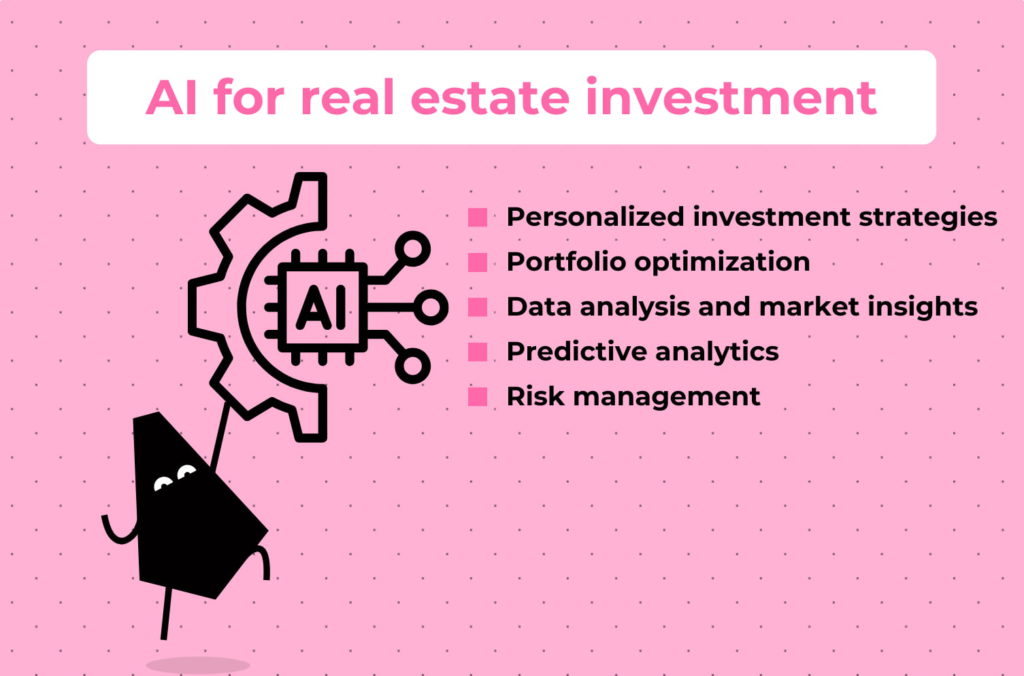How can AI help with real estate investments management?

“There are three things you can watch forever: fire burning, water falling, and AI transforming various industries…” You might notice these words in our previous research about the impact of AI and IoT on healthcare data security. Now, it is the real estate turn. In recent years, we have witnessed how AI has emerged as one of the solutions to real estate problems.
Some interesting figures: 63% of property companies report that the implementation of an artificial intelligence solution resulted in a revenue increase. Gen AI could generate $110 billion to $180 billion or more in value for the real estate industry. In working with AI, real estate companies gain over 10 percent or more in net operating income through more efficient operating models, stronger customer experience, tenant retention, new revenue streams, and smarter asset selection.
Therefore, AI presents a wealth of opportunities to optimize decision-making processes, mitigate risks, and maximize returns. In this article, we explore the multifaceted ways in which AI is reshaping the real estate investment sector, shedding light on its transformative potential and the benefits it brings to stakeholders navigating the complexities of investment management.
Check out our AI transformation service for better investment management
Why AI for real estate investment?

AI has proved to be a game-changer in the realm of real estate, particularly investment management, offering innovative solutions to streamline processes and have investor’s back in decision-making. Here are some examples of how AI is transforming real estate investment management:
Personalized investment strategies: AI-driven investment platforms analyze investor behavior, risk tolerance, and financial goals to recommend customized investment options. This personalized approach aligns investment strategies with individual preferences, improving investment outcomes and enhancing investor satisfaction.
Portfolio optimization: AI offers advanced portfolio optimization techniques that analyze multiple investment parameters to construct an optimal portfolio mix tailored to the investor’s objectives and constraints. Continuous monitoring and rebalancing of asset allocations ensure that the portfolio remains aligned with the investor’s goals.
Data analysis and market insights: AI processes vast amounts of data from various sources, including property listings, market trends, demographic information, and economic indicators. By analyzing this data, AI can provide valuable insights into market dynamics, helping investors identify lucrative investment opportunities and make informed decisions.
Predictive analytics: AI-powered predictive analytics can forecast future market trends and property values with remarkable accuracy. This enables investors to anticipate market fluctuations, assess investment risks, and optimize their portfolio allocation accordingly.
Risk management: AI algorithms can assess various risk factors, such as market volatility, economic indicators, and property-specific characteristics, to quantify and mitigate potential risks. Real-time monitoring and alerts provided by AI-driven risk management tools enable investors to react promptly to changing market conditions and mitigate potential losses.
What are AI real estate solutions for investors?
Incorporating AI real estate solutions into investment management practices not only improves efficiency and accuracy but also enhances the overall experience for investors and stakeholders involved in the real estate investment process. This is exactly how it enhances:
Property search
AI-driven property search platforms utilize machine learning algorithms to recommend relevant properties to investors based on their preferences, budgets, and investment criteria. These platforms help investors discover new opportunities and streamline the property search process.
Residential and commercial property valuation
AI-powered property valuation methods leverage machine learning techniques to assess property values based on key factors such as location, size, amenities, and recent sales data. By analyzing vast datasets, these models enable more accurate and efficient property appraisals, facilitating better-informed investment decisions.
Real estate investment business plan preparation
AI can assist in creating comprehensive business plans for real estate investments by analyzing market trends, financial projections, and investment objectives. Real estate AI tools can generate customized real estate finance and investments, helping investors outline their goals, strategies, and execution plans effectively.
Real-time monitoring and alerts
AI-driven risk management tools provide real-time monitoring of market conditions and portfolio performance. By tracking key metrics and indicators, these tools alert investors to potential risks and opportunities, allowing them to make timely adjustments to their investment strategies.
AI for real estate agents
AI might be helpful not only for real estate investors but also for real estate agents and property managers. Let’s look at how it can work in favor of them.
Listing description generation
AI generative algorithms can generate compelling listing descriptions for properties based on their features, amenities, and neighborhood characteristics. This helps attract potential investors or tenants by providing informative and engaging descriptions of the property’s key selling points.
Virtual tours and staging
AI enables the creation of virtual reality and augmented reality tools that provide immersive tours of properties. These virtual tours allow potential buyers or tenants to explore properties remotely and visualize them furnished or staged according to their preferences.
Lead generation and customer service
AI chatbots and virtual assistants engage with potential clients on real estate websites, answering questions, providing information about properties, and scheduling appointments. This enhances customer service and streamlines lead-generation efforts for real estate agents and brokers.
AI for property managers
Property management automation
AI-powered platforms streamline property management workflow automation, and property management tasks such as rent collection, maintenance scheduling, and tenant communication. By automating property management, AI reduces operational costs and improves efficiency for property managers, allowing them to focus on value-added activities.
AI real estate use-cases
AI-powered sentiment analysis tool for real estate
At GreenM, we strongly believe in the power of AI. Which is why we built our product called Trevise. AI-powered sentiment analysis tools can provide valuable insights into public sentiment, customer feedback, brand reputation, and market dynamics. Here’s how such a tool can be applied:
- Market research and analysis:
- Real estate developers and investors can use sentiment analysis to gauge public sentiment toward specific neighborhoods, cities, or property types.
- By analyzing social media conversations, online reviews, and news articles, developers can gain insights into factors influencing property demand, such as local amenities, transportation infrastructure, and economic trends.
- Customer feedback and satisfaction:
- Real estate agents and property managers can use sentiment analysis to monitor customer feedback and satisfaction levels.
- By analyzing customer reviews and feedback on platforms such as social media, review websites, and online forums, agents can identify areas for improvement and address any issues raised by clients promptly.
- Brand reputation management:
- Real estate companies can use sentiment analysis to monitor their brand reputation and manage online perceptions.
- By tracking mentions of their brand name and analyzing sentiment across various online channels, companies can identify potential reputational risks and take proactive measures to address them.
- Competitor analysis:
- Real estate professionals can use sentiment analysis to monitor competitor activity and sentiment towards competing properties or companies.
- By analyzing online discussions and reviews related to competitors, companies can identify competitive strengths and weaknesses and adjust their strategies accordingly.
- Investor sentiment analysis:
- Real estate investors can use sentiment analysis to assess market sentiment and investor sentiment toward specific property types or markets.
- By analyzing sentiment indicators such as news sentiment, social media sentiment, and investor sentiment indexes, investors can make more informed decisions about when to buy, sell, or hold properties.
Machine learning (ML) for real estate:
- ML algorithms can analyze historical data to identify patterns and trends in real estate markets, helping investors make informed decisions about buying, selling, or holding properties.
- ML models can predict property prices, rental yields, and market trends, enabling investors to optimize their portfolio allocation and maximize returns.
- ML-powered risk assessment tools can quantify and mitigate potential risks associated with real estate investments, enhancing portfolio resilience and stability.
Deep Learning (DL) for real estate:
- DL algorithms analyze large volumes of unstructured data, such as images and videos, to extract valuable insights about property characteristics and market conditions.
- DL models can detect anomalies and outliers in real estate datasets, helping investors identify hidden opportunities or potential risks that may not be apparent through traditional analysis methods.
- DL-powered recommendation systems can suggest personalized investment strategies based on individual investor preferences, risk tolerance, and financial goals.
Neural networks for real estate:
- Neural networks can model complex relationships between various factors influencing real estate markets, including economic indicators, demographic trends, and regulatory changes.
- Neural network-based forecasting models can predict future property values, rental demand, and market dynamics with greater accuracy than traditional statistical methods, helping investors anticipate market trends and make proactive investment decisions.
Genetic algorithms for real estate:
- Genetic algorithms can optimize real estate investment strategies by iteratively evolving and selecting the most promising investment portfolios based on predefined objectives and constraints.
- Genetic algorithms can search for optimal combinations of investment parameters, such as asset allocation, geographic location, and risk tolerance, to maximize portfolio returns while minimizing risks.

Conclusion: put real estate and AI together
So, the best way to manage investments in real estate and mitigate investment risks is to apply AI-powered predictive analytics, stick to personalized investment strategy powered with AI, and get the best from real estate AI tools. The combination of AI and real estate investment is a powerful catalyst for transforming traditional approaches to portfolio management and making informed decisions.






